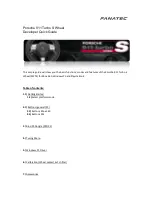
06 Maintenance and specifications
Wheels and tires
06
242
Introduction
Your vehicle is equipped with tires according
to the vehicle's tire information placard on the
B-pillar (the structural member at the side of
the vehicle, at the rear of the driver's door
opening), or on the inside of the fuel filler door
on Canadian models.
CAUTION
Some Volvo models are equipped with an
Ultra High Performance tire and wheel com-
bination designed to provide maximum dry
pavement performance with consideration
for hydroplaning resistance. As such, they
may be more susceptible to road hazard
damage and, depending on driving condi-
tions, may achieve a tread life of less than
20,000 miles (30,000 km). Even if this vehi-
cle is equipped with Volvo’s advanced AWD
or DSTC system, these tires are not
designed for winter driving, and should be
replaced with winter tires when weather
conditions dictate.
The tires have good road holding characteris-
tics and offer good handling on dry and wet
surfaces. It should be noted however that the
tires have been developed to give these fea-
tures on snow/ice-free surfaces.
Certain models are equipped with "all-season"
tires, which provide a somewhat higher degree
of road holding on slippery surfaces than tires
without the "all-season" rating. However, for
optimum road holding on icy or snow-covered
roads, we recommend suitable winter tires on
all four wheels.
When replacing tires, be sure that the new tires
are the same size designation, type (radial) and
preferably from the same manufacturer, on all
four wheels. Otherwise there is a risk of altering
the car's roadholding and handling characte-
ristics.
New Tires
Remember that tires are perishable goods. As
of 2000, the manufacturing week and year
(Department of Transportation (DOT) stamp)
will be indicated with 4 digits (e.g. 1502 means
that the tire illustrated was manufactured dur-
ing week 15 of 2002).
G021823
Tire age
Tires degrade over time, even when they are
not being used. It is recommended that tires
generally be replaced after 6 years of normal
service. Heat caused by hot climates, frequent
high loading conditions or Ultra Violet (U.V)
exposure can accelerate the aging process.
You should replace the spare tire when you
replace the other road tires due to the aging of
the spare.
A tire's age can be determined by the DOT
stamp on the sidewall (see the illustration).
A tire with e.g., visible cracks or discoloration
should be replaced immediately.
Improving tire economy
•
Maintain correct tire pressure. For the tire
pressure tables, see pages 247 and 247.
•
Drive smoothly: avoid fast starts, hard
braking and tire screeching.
•
Tire wear increases with speed.
•
Correct front wheel alignment is very
important.
•
Unbalanced wheels impair tire economy
and driving comfort.
•
Tires must maintain the same direction of
rotation throughout their lifetime.
•
When replacing tires, the tires with the
most tread should be mounted on the rear
Summary of Contents for 2010 V70
Page 1: ...VOLVO V70 XC70 Owner s Manual Web Edition ...
Page 2: ......
Page 7: ...Contents 7 ...
Page 13: ...01 SAFETY ...
Page 50: ...50 Remote key and key blade 52 Private locking 59 Keyless drive 60 Locks 63 Alarm 65 ...
Page 51: ...02 LOCKS AND ALARM ...
Page 69: ...03 YOUR DRIVING ENVIRONMENT ...
Page 70: ...03 Your driving environment Instruments and controls 03 70 Instrument overview ...
Page 117: ...03 Your driving environment 03 117 ...
Page 119: ...04 COMFORT AND DRIVING PLEASURE ...
Page 191: ...05 DURING YOUR TRIP ...
Page 213: ...06 MAINTENANCE AND SPECIFICATIONS ...
Page 235: ...06 Maintenance and specifications Fuses 06 235 Engine compartment ...
Page 268: ...06 Maintenance and specifications Label information 06 268 Location of labels ...
Page 288: ...07 Index 07 288 ...
Page 289: ......
Page 290: ...Kdakd 8Vg 8dgedgVi dc IE JH6 8VcVYV 6I Eg ciZY c HlZYZc iZWdg 8deng i Kdakd 8Vg 8dgedgVi dc ...
















































